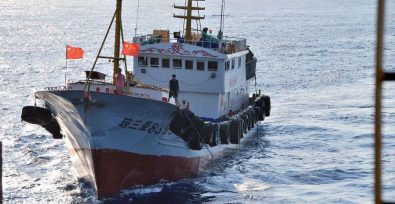A four-year investigation by an international team of reporters from dozens of newspapers and magazines reveals a persistent pattern of severe human rights abuses linked to the global seafood industry, with China at the center of attention due to its extensive high-seas fishing fleet and seafood processing capabilities.
Reports include tales of debt bondage, wage withholding, excessive working hours, physical abuse, passport confiscation, and even deaths on Chinese fishing vessels.
Uncovering the truth
China’s fishing fleet is mostly unregulated which is why this thorough investigation is unprecedented.
Journalists rarely gain access to Chinese vessels, making investigative journalism in this domain exceptionally challenging despite existing stories of abuse.
To delve into this world, the team of reporters from two dozen magazines and newspapers visited China’s fishing ships in various major fishing grounds, ranging from the Galapagos Islands to Korea. Occasionally, some were permitted aboard the ships to talk to the crew, but often the ships would flee at the sight of the journalists.
To tackle the issue of the lack of transparency in the seafood industry, where handoffs between fishing boats, carrier ships, processing plants, and exporters create traceability gaps, the team relied on satellite tools to track ships, labor contracts, and trade data to follow the trail.
The human face of labor abuse
What they uncovered were numerous cases of labor rights violations, with instances of debt bondage where crew members were effectively trapped in servitude due to payments they couldn’t settle. Allegations of unpaid wages, brutal working conditions, and physical abuse were disturbingly common. Many workers endured shifts lasting more than twelve hours, laboring for extended periods without reprieve.
Ian Urbina for Time shares,
Before the COVID-19 pandemic, Chinese fishing ships often used Indonesian deckhands, but with the global lockdowns in response to the pandemic, captains shifted to primarily Chinese crews. Court records offered a rare window into the problem of Chinese-on-Chinese labor abuse, including the trafficking of workers, typically from poorer inland regions of the country. Labor contracts provided by former deckhands from fishing ships and online advertisements posted by recruiters showed how the unwitting and desperate are often targeted in schemes that amount to labor trafficking.
The trail to our plates
Venturing further down the supply chain, the complexities of tracing these human rights violations back to the final consumers came to light. The trail led from abuses on the high seas to seafood processing facilities in China, which supplied global brands. Most alarmingly, it was found that Uyghur workers were forcibly relocated to seafood factories in Shandong, a major seafood processing hub on China’s eastern coast. These factories supplied hundreds of restaurants, supermarkets, and food service providers across the United States and Europe.
The amount of data gathered by the team of journalists is staggering – and they didn’t manage to visit every ship. In June 2023, a beachgoer found a bottle with an SOS message in Mandarin from a ship crew member pleading for help after being allegedly detained by their company. Unfortunately, the ship in question was one of many that bolted at the journalists’ approach.
There is enough information, however, to enforce forced labor policies. Bringing change to the seafood industry will require the collective efforts of governments, consumers, and organizations alike.
Take action today and stand with us against Uyghur forced labor.








Freedom United is interested in hearing from our community and welcomes relevant, informed comments, advice, and insights that advance the conversation around our campaigns and advocacy. We value inclusivity and respect within our community. To be approved, your comments should be civil.
So glad I am a vegan .
Be VEGAN and you won’t have these problems. Very simple.
This is horrible